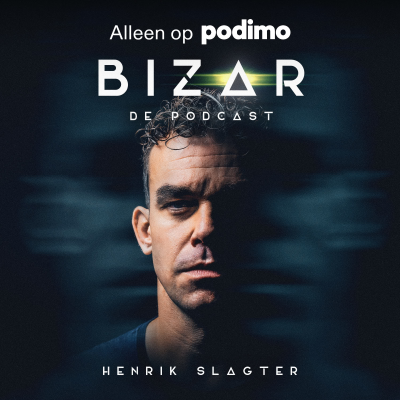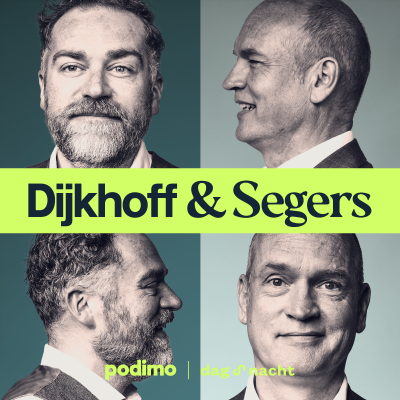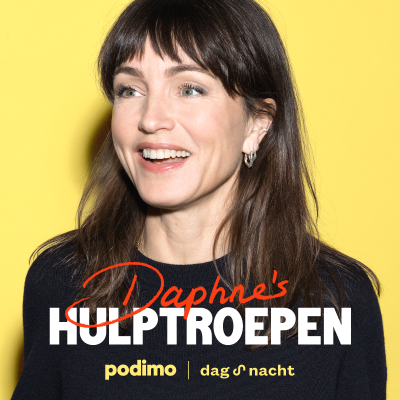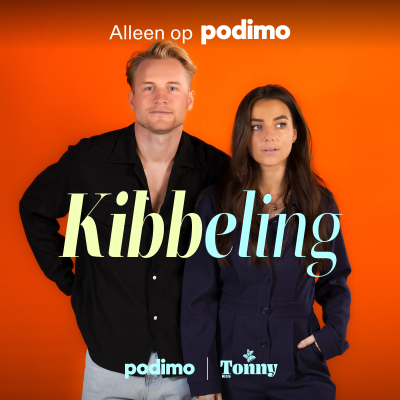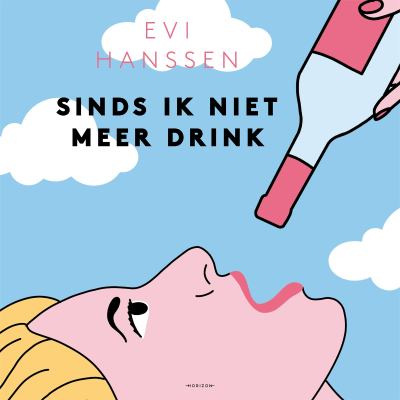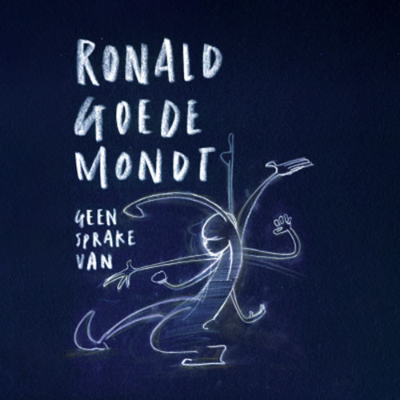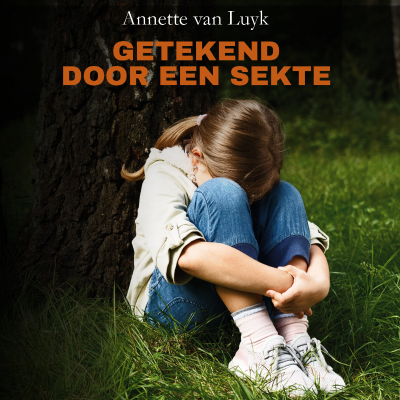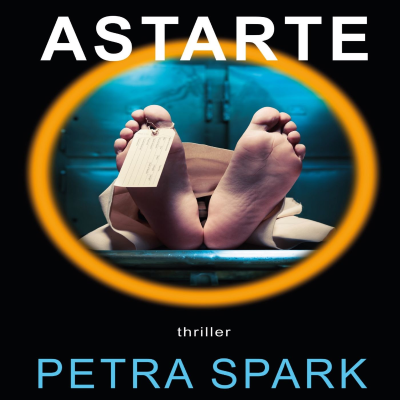
The Metabolism, Muscles, and Mindset Podcast
Engels
Gezondheid & Persoonlijke Ontwikkeling
Tijdelijke aanbieding
2 maanden voor € 1
Daarna € 9,99 / maandElk moment opzegbaar.
- 20 uur luisterboeken / maand
- Podcasts die je alleen op Podimo hoort
- Gratis podcasts
Over The Metabolism, Muscles, and Mindset Podcast
Welcome to "The Muscles & Mindset Podcast", with your host Dr. Ali Novitsky, an acclaimed obesity medicine expert, renowned for her unique expertise in muscle optimization through exercise, nutrition, and mindset work. Her revolutionary approach to health and wellness. Dr. Novitsky is not just an expert; she is a catalyst, propelling individuals on their journey of transformation, fostering strength, endurance, and resilience, and reshaping the landscape of obesity medicine. The Muscles & Mindset Podcast aims to foster not just knowledge, but action. We'll unravel the secrets to optimizing muscle development, adhering to a nourishing diet, and cultivating a resilient mindset - three crucial pillars of a healthy and fulfilling lifestyle. But more than that, we'll provide you with actionable strategies, practical tips, and effective tools that you can seamlessly incorporate into your daily routines. This podcast isn't just about understanding the muscles and mindset, it's about turning that understanding into positive, transformative action. Get ready to embark on a journey of self-discovery and self-improvement, as you tune in to the Muscles & Mindset Podcast. Together, we'll navigate the path of health and wellness, one episode at a time. Dr. Ali Novitsky's work can be found at https://thefitcollective.com.
Alle afleveringen
148 afleveringenStress Series - 07 - Relationship Stress Dynamics: For Couples & Teams
In this episode, Dr. Ali Novitsky, triple-boarded physician, Master Coach, and founder of The FIT Collective, continues her deep exploration of stress — this time focusing on how different stress types influence relationships, team dynamics, and emotional regulation. Dr. Ali revisits the origins of her company, MindBodyMarriage, as she lays the groundwork for a series on how stress types interact in pairs, families, and professional teams. Key Points Discussed: 1. Why Stress Types Matter in Relationships Dr. Ali explains that interactions between stress types can be complex and deeply influential. By understanding: * What each type does when stressed, and * What each type contributes when regulated, We can accurately predict team behavior, decrease conflict, and strengthen relationships. This awareness becomes essential when multiple people—and multiple stress types—interact at once 2. A Review of The Six Stress Types: Assertive – Stressed: takes over; Regulated: decisive leader. Isolation – Stressed: avoids vulnerability; Regulated: productive, independent. Control – Stressed: rigid, inflexible; Regulated: organized, structured. Validation – Stressed: seeks reassurance; Regulated: creates harmony. Impulsivity – Stressed: reacts quickly; Regulated: creative, executes well. Catastrophizing – Stressed: fears worst-case; Regulated: strong problem-solver. 3. Real-Life Application: Team Dynamics Dr. Ali illustrates a medical code scenario with two possible outcomes: Dysregulated Team * Assertive type takes over abruptly * Isolation type withdraws * Control type panics over broken expectations * Validation type doubts themselves * Impulsive type fires off ideas without follow-through * Catastrophizing type spirals into worst-case thinking The team technically achieves the outcome—but experiences burnout, fear, and dysfunction. Regulated Team * Assertive type leads with clarity * Isolation type stays focused and productive * Control type keeps structure * Validation type creates calm * Impulsive type supports with creativity * Catastrophizing type anticipates needs and supports problem solving Same patient outcome—entirely different team experience. Dr. Ali emphasizes that true success includes psychological safety, teamwork, and emotional regulation. 3. The “Leaky Valve” Analogy Dr. Ali introduces the concept of a leaky emotional valve: When we are chronically dysregulated, stress “leaks” into every system in our lives—relationships, work, communication, and health. Regulation closes the valve, making all downstream healing easier. Takeaways * Understanding your stress type increases self-awareness and compassion. * Daily regulation practice—not occasional effort—is necessary for real change. * Healthy teams are built on regulation, not perfection. * You can always choose to become the “regulated member” of your team. Timestamps 00:00 – Introduction & why this series matters 00:27 – MindBody Marriage → The FIT Collective 00:38 – Stress & relationships: the “relationship matrix” 02:03 – Different stress scenarios in relationships and teams 02:24 – Overview of the 6 stress types 05:06 – Assertive stress type 06:11 – Isolation stress type 07:09 – Control stress type 08:51 – Impulsivity stress type 10:06 – Catastrophizing stress type 11:22 – Validation stress type 12:22 – Dysregulated team code scenario 18:29 – Regulated team code scenario 26:01 – How do we measure team success? 27:29 – Why whole-team training and daily regulation matter 28:43 – Transform 10 & the leaky valve 29:26 – Private coaching with The FIT Collective Work with Dr. Ali 🔥 Transform® 10.0 [https://www.dralinovitsky.com/transform] – Enrollment is open! 🌿 Nutrition Training & Obesity Prevention [https://www.thefitcollective.com/nutrition-training] - Start today. * 💪 Beginner Strength Training Program [https://www.dralinovitsky.com/beginner-program] – 12 months for just $199! 🧘 Total Fitness Program [https://www.dralinovitsky.com/total-fitness] – A 12-month mind-body transformation * 🧪 Get 15% off InBody Models (USA/Canada) [https://inbodyusa.com/discount/FITCOLLECTIVE] – Small referral commission may apply
Stress Series - 06 - Distress' Impact on Your Body
Podcast Episode Synopsis Episode Title: Distress' Impact on Your Body Host Introduction In this episode, Dr. Ali Novitsky, expert in obesity medicine and founder of The FIT Collective, continues her series on stress—this time focusing on how stress impacts the body. Dr. Ali keeps this episode concise and reflective, encouraging listeners to pause and connect with how stress shows up physically. Key Points Discussed 1. Physical Impacts of Stress * Joint Pains and Muscle Recovery: Dr. Ali explains that elevated cortisol during stress can delay recovery and increase joint or muscle pain. * Heightened Irritability and Tension: Stress raises irritability and muscle tightness. Dr. Ali suggests a quick body scan—especially noticing how high the shoulders are—as a simple stress check. * Perimenopause and Stress: Stress can amplify perimenopausal symptoms such as night sweats and hot flashes. Dr. Ali references research showing that gentle, low-impact exercise (like walking or stretching) can lessen these effects. * Immunity and Hormones: Chronic stress impacts immune function through cortisol and insulin dysregulation. High insulin promotes water retention and inflammation, increasing risk for long-term conditions such as heart disease and cancer. 2. Personal Reflection and Daily Practice Dr. Ali invites listeners to notice the specific ways stress manifests in their own bodies. She shares that for her, stress often looks like: * Speaking rapidly * Poor sleep * Emotional eating * Digestive issues * Headaches or muscle soreness She encourages creating a daily “body check-in” practice—noticing tension, breath, and posture throughout the day. Awareness is the first step to release. 3. Self-Compassion Over Criticism Dr. Ali emphasizes that judgment and self-criticism amplify stress, while self-compassion lowers it. She reminds listeners that it’s normal to feel stressed and that progress, not perfection, is the goal. Replacing inner criticism with phrases like “I’m doing my best right now” supports both emotional and physical resilience. 4. Actionable Steps Dr. Ali closes with three takeaways listeners can begin today: 1. Acknowledge Stress: Recognize how stress physically shows up in your body—fatigue, muscle tension, or irritability. 2. Daily Check-In: Build a brief daily practice to notice posture, breath, or areas of tightness. 3. Self-Compassion Plan: Practice kindness toward yourself—affirm that stress is a human experience and that rest and recovery are productive. Conclusion Dr. Ali concludes by reminding listeners that acknowledging stress is the first step in managing it. The body keeps the score, but with awareness, movement, rest, and self-compassion, we can heal and thrive. She encourages listeners to be gentle with themselves and to prioritize recovery just as much as performance. Timestamps 00:00:06 – Introduction & Overview 00:01:10 – Physical Impact of Stress 00:01:20 – Joint Pain & Delayed Recovery 00:02:13 – Perimenopause & Stress 00:02:24 – Exercise & Menopause Symptoms 00:03:17 – Immunity & Hormones 00:03:38 – Cortisol and Insulin 00:04:21 – Inflammation & Water Retention 00:05:03 – GLP-1 and Heart Health 00:05:14 – Body Carries Stress 00:05:24 – Personal Stress Symptoms 00:06:09 – Daily Body Check-In 00:06:31 – Exercise as Emotional Regulator 00:06:53 – Personal Experience with Stress 00:07:45 – Managing Stress Strategies 00:08:07 – Daily Awareness Practice 00:09:20 – Rest, Nutrition, Activity 00:09:41 – Self-Compassion Practice 00:11:06 – Movement & Stress Relief 00:12:11 – Transform Program & Stress Quiz Work with Dr. Ali 🔥 Transform® 10.0 [https://www.dralinovitsky.com/transform] – Enrollment is open! 🌿 Nutrition Training & Obesity Prevention [https://www.thefitcollective.com/nutrition-training] - Start today. 💪 Beginner Strength Training Program [https://www.dralinovitsky.com/beginner-program] – 12 months for just $199! 🧘 Total Fitness Program [https://www.dralinovitsky.com/total-fitness] – A 12-month mind-body transformation 🧪 Get 15% off InBody Models (USA/Canada) [https://inbodyusa.com/discount/FITCOLLECTIVE] – Small referral commission may apply
Stress Series - 05 - Distress and Distorted Thoughts
🧠 Episode Summary In this solo episode, Dr. Ali Novitsky continues her transformative Stress Series by breaking down how stress hijacks your thoughts — and what to do when it happens. When your stress level hits a 7 or higher, your brain gets hijacked: the amygdala (fear center) takes over, and the prefrontal cortex (rational thinking) gets shut down. The result? You spiral into distorted thought patterns that feel real but aren’t rooted in truth. Ali explains the top thought distortions — like catastrophizing, personalization, and all-or-none thinking — and shows how they often align with your dominant stress type. Once you learn how to identify these patterns, you can regulate your stress, pause, and choose a new, more grounded response. This episode offers a practical, compassionate framework for understanding your stress response and building emotional resilience. 🔍 What You’ll Learn * What happens in your brain during a “mental hijack” * The most common thought distortions under stress * How thought patterns connect to your dominant stress type * Why we catastrophize, personalize, or spiral when we’re overwhelmed * How to regulate your nervous system before trying to “fix” your thoughts * Real-life examples of how Ali applies this work in daily life and coaching 💡 Thought Distortions & Stress Type Pairings * Validation Type → Personalization: “It must be my fault.” * Impulsivity Type → Jumping to Conclusions: “I have to fix it now.” * Assertive Type → All-or-None Thinking: “If I don’t do it perfectly, I’ve failed.” * Control Type → All-or-None Thinking + Should Statements: “I should have done more.” * Isolation Type → Should Statements + Self-Blame: “It’s all on me.” * Catastrophizing Type → Catastrophizing: “The worst is definitely going to happen.” Ali emphasizes that any person can experience any of these distortions under pressure—but your dominant stress type tends to shape your most common response. 🛠️ Tools to Disrupt the Spiral * Pause & Regulate before solving: Your best thoughts come when you’re calm. * Distraction for acute stress (7–10 on the scale): Functional first aid for your mind. * Cognitive Reframes once regulated: * Personalization → “What if it’s not about me?” * Impulsivity → “What if there’s another option?” * All-or-None → “Some is better than none.” * Should Statements → “I could have…” * Catastrophizing → “What’s possible vs. what’s probable?” 📌 Take the Free Stress Type Quiz Find out your dominant stress type and start regulating more effectively today. 🎯 https://www.dralinovitsky.com [https://www.dralinovitsky.com/] 🌟 Now Enrolling: Transform 10.0 Ali’s signature coaching program is back with a renewed focus on nervous system regulation, whole-person health, mindset, and metabolic strength. ✨ Join the January cohort: https://www.dralinovitsky.com/transform [https://www.dralinovitsky.com/transform] ⏱️ Timestamps 00:00:00 - Introduction to the Stress Series 00:00:27 - Taking the Stress Test 00:01:10 - Understanding Stress and Thought Distortions 00:02:24 - Recognizing Thought Hijacking 00:03:31 - Common Thought Distortions 00:05:08 - All or None Thinking 00:06:34 - Validation and Personalization 00:10:20 - Impulsivity and Jumping to Conclusions 00:12:07 - Assertive Stress Type and Control 00:15:30 - Should Statements and Isolation 00:18:44 - Catastrophizing and Its Implications 00:20:53 - Review of Stress Types and Thought Distortions 00:21:57 - Strategies for Regulating Thoughts 00:23:22 - Transform 10.0 and Stress Management 00:24:17 - Conclusion and Resources Work with Dr. Ali * 🔥 Transform® 10.0 [https://www.dralinovitsky.com/transform] – Enrollment is open! * 🌿 Nutrition Training & Obesity Prevention [https://www.thefitcollective.com/nutrition-training] - Start today. * 💪 Beginner Strength Training Program [https://www.dralinovitsky.com/beginner-program] – 12 months for just $199! * * 🧘 Total Fitness Program [https://www.dralinovitsky.com/total-fitness] – A 12-month mind-body transformation * 🧪 Get 15% off InBody Models (USA/Canada) [https://inbodyusa.com/discount/FITCOLLECTIVE] – Small referral commission may apply
Stress Series - 04 -Resilience in High-Stress Settings
Episode Title: Developing Resilience in High-Pressure Situations Summary Welcome back to the Metabolism, Muscles, & Mindset Podcast with Dr. Ali Novitsky, board-certified obesity medicine physician and expert in stress, strength, and self-regulation. In this episode of the Stress Series, Dr. Novitsky explores how to build true resilience — not in serene environments, but in the moments that truly test us. Whether you're navigating life-or-death emergencies or emotionally charged situations, this conversation reveals how to stay centered and in control, even when your nervous system wants to panic. Using a powerful varicose vein metaphor, she explains how chronic stress is like a “leaky valve” — unless you address the root cause (emotional dysregulation), surface-level fixes like better habits won’t stick. The solution? A simple pause. Dr. Novitsky teaches how a 2–3 second pause in the heat of stress can stop the brain’s “hijack” and activate the prefrontal cortex: our reasoning center. She breaks down three stress scenarios and guides listeners toward the third, most empowering one: awareness, presence, and intentional breath. Drawing from cognitive behavioral therapy (CBT) and dialectical behavioral therapy (DBT), Dr. Novitsky offers a toolkit for regulating emotions, accessing your “wise brain,” and debriefing after stressful moments to rewire your response. Whether in medicine, sports, family dynamics, or everyday life, this episode shows how resilience can be learned — and why it's the key to long-term transformation. Key Points • Beyond the Spa: Real resilience is built in chaos, not calm. • The Leaky Valve Analogy: Fix emotional dysregulation at the root for lasting stress relief. • Stress Is Automatic: The fight-or-flight response can’t be stopped—but it can be reshaped. • The Power of the Pause: A brief, intentional check-in prevents spiraling and restores clarity. • Three Stress Scenarios: 1. Hijacked and unaware. 2. Aware but suppressing. 3. Aware and present—the goal. • Tools from CBT & DBT: Learn to regulate emotions and access clear, productive thinking. • Debrief to Rewire: Reflecting after stress creates new mental pathways for resilience. • Lifelong Practice: Emotional regulation isn’t a finish line—it’s a daily skill worth mastering. Take the DistressRx Assessment HERE [https://www.thefitcollective.com/distressrx-tool]! Timestamps • 00:02 – Intro: Managing real-world stress • 02:10 – The “leaky valve” analogy for chronic stress • 04:00 – Understanding the HPA axis and stress physiology • 05:40 – Prefrontal cortex hijacking: why we spiral • 07:10 – The pause as a regulation tool • 09:30 – Scenario breakdown: hijack, suppression, or presence • 11:50 – Staying calm in acute stress (e.g., medical emergencies) • 13:40 – Building confidence by staying grounded • 15:00 – Personal story: trauma and resilience in college athletics • 18:20 – CBT vs. DBT: how emotions shape thoughts • 21:40 – Tools for distress tolerance and “wise mind” • 24:40 – Personal debriefs: your secret weapon for growth • 27:40 – Real-life triggers and emotional awareness • 30:10 – Transform 10: a year-long stress mastery program Follow Dr. Ali Novitsky on TikTok | Facebook [https://www.facebook.com/DrAliNovitsky] | Instagram [https://www.instagram.com/alinovitskymd] | YouTube [https://www.youtube.com/@alinovitskymd] Subscribe to the Metabolism, Muscles, and Mindset Podcast on Spotify [https://open.spotify.com/show/1f6JNb1CWaN0a5ZLQbLx1U] | Apple Podcasts Work with Dr. Ali * 🔥 Transform® 10.0 [https://www.dralinovitsky.com/transform] – Enrollment is open! Bonus content available now * 🌿 Nutrition Training & Obesity Prevention [https://www.thefitcollective.com/nutrition-training] * 💪 Beginner Strength Training Program [https://www.dralinovitsky.com/beginner-program] – 12 months for just $199! * 🧘 Total Fitness Program [https://www.dralinovitsky.com/total-fitness] – A 12-month mind-body transformation * 🧪 Get 15% off InBody Models (USA/Canada) [https://inbodyusa.com/discount/FITCOLLECTIVE] – Small referral commission may apply
Stress Series - 03 - Awareness: Naming Stress in the Moment
Episode Summary: In this episode, Dr. Ali Novitsky, MD, your favorite obesity medicine doctor & fitness guru, continues her exploration of stress management, building on insights from previous episodes. She recaps the physiology of stress and the six identified stress types: Assertive, Control, Validation, Isolation, Catastrophizing, and Impulsivity. Understanding one’s stress type is emphasized as crucial, since it allows individuals to tailor their approach to managing stress more effectively. Dr. Novitsky introduces a powerful tool: “Name It to Tame It.” By identifying and naming emotions, people can significantly reduce their intensity and regain control over stress levels. She shares a story about a child’s first day at a new school, illustrating how naming feelings of anxiety helped her manage emotions more effectively. The discussion highlights the importance of noticing where emotions are felt in the body and how describing these sensations can be as effective as naming them. Dr. Novitsky encourages listeners to take 90 seconds to sit with their emotions, breathe, and practice mindfulness as a way to regulate emotional responses. Breathwork is presented as a simple yet powerful strategy for emotional regulation, and Dr. Novitsky encourages the audience to integrate this practice. As the episode concludes, listeners are reminded to take the stress type test linked in the show notes, which will be helpful for the ongoing series. She also announces the upcoming Transform 10 program — focused on emotional regulation and stress management, beginning in January. Dr. Ali invites everyone to continue exploring these vital topics together and to discover ways to transform stress into a superpower. Time Stamps: 00:00:00 - Introduction to Stress Management An overview of the podcast series on stress, including previous episodes and the importance of understanding stress types. 00:01:11 - The Six Stress Types Discussion of the six identified stress types: Assertive, Control, Validation, Isolation, Catastrophizing, and Impulsivity. 00:02:05 - Stress as a Health Priority The significance of stress management and its acceptance compared to physical health issues. 00:03:19 - Name It to Tame It Introduction of the tool for emotional awareness and regulation, emphasizing the importance of naming emotions. 00:04:11 - Real-Life Application: A Personal Story A personal anecdote about the host's daughter experiencing anxiety on her first day at a new school. 00:06:00 - The Power of Naming Emotions Explaining how identifying emotions can reduce their intensity and help in managing stress. 00:08:07 - Describing Physical Sensations The importance of recognizing and describing physical sensations associated with emotions. 00:10:05 - Emotional Processing and Family Dynamics Insights into family discussions about emotions and the role of shared experiences in emotional regulation. 00:12:05 - The 90-Second Rule Explaining the significance of the 90-second timeframe for processing emotions and the role of breathwork. 00:13:43 - Breathwork Techniques Introduction to breathwork as a tool for emotional regulation and its accessibility in various situations. 00:15:10 - Engaging in Fun Breathing Exercises A light-hearted approach to practicing breathwork with family to enhance emotional regulation. 00:17:39 - The Superpower of Emotional Awareness Encouragement to embrace emotional awareness and the benefits of understanding one's feelings. 00:18:31 - Upcoming Programs and Resources Information about the Transform 10 program and the importance of enrolling for further support in stress management. Work with Dr. Ali * 🔥 Transform® 10.0 [https://www.dralinovitsky.com/transform] – Enrollment is open! Bonus content available now * 🌿 Nutrition Training & Obesity Prevention [https://www.thefitcollective.com/nutrition-training] * 💪 Beginner Strength Training Program [https://www.dralinovitsky.com/beginner-program] – 12 months for just $199! * 🧘 Total Fitness Program [https://www.dralinovitsky.com/total-fitness] – A 12-month mind-body transformation * 🧪 Get 15% off InBody Models (USA/Canada) [https://inbodyusa.com/discount/FITCOLLECTIVE] – Small referral commission may apply
Kies je abonnement
Tijdelijke aanbieding
Premium
20 uur aan luisterboeken
Podcasts die je alleen op Podimo hoort
Gratis podcasts
Elk moment opzegbaar
2 maanden voor € 1
Daarna € 9,99 / maand
Premium Plus
Onbeperkt luisterboeken
Podcasts die je alleen op Podimo hoort
Gratis podcasts
Elk moment opzegbaar
Probeer 30 dagen gratis
Daarna € 11,99 / maand
2 maanden voor € 1. Daarna € 9,99 / maand. Elk moment opzegbaar.






